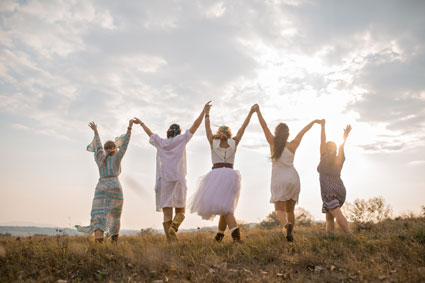Introduction
No doubt about it, every culture and country has its own traditions. Some of these traditions may seem odd to non-natives, but diversity is what makes the world so interesting. Russia is also a land that has long existed behind a curtain of secrecy. Now that the curtain has parted, people are learning surprising facts about Russian life, its people, and its beauty. Unfortunately, numerous myths persist concerning the Russian people and their lifestyle. Business and leisure travelers should know what is true and what is not when it comes to Russian traditions and myths.
Drinking
Russians love a good drink, but they are not walking around the streets sipping vodka all day long. A myth that continues to persist well into the 21st century is that if you are Russian, you love vodka. The truth is, while vodka is one of the most popular drinks in Russia, so is cognac, and a variety of specially designed home-brews. Russians also like wine, of all sorts.
In Russian culture, excessive drinking is known as "the green serpent" or zelyoniy, this implies a person who is either binge drinking or drinking to excess on a specific occasion. A constant drinker is known as a poddavat. In Russia, it is true that people like to drink, and drinks in many restaurants, including vodka, wine, and cognac, are sold or served in 100, 200, or 500 g. serving sizes. It is interesting, and sometimes amusing, to realize that many vodka bottle brands in Russia do not have a closable top.
Yes, Russians are known for their heavy drinking, but that does not mean that they cannot handle their liquor. For example, when you are invited to someone's house, do not expect before or after dinner drinks. The drinks will be served during mealtime. On the table, you may find a bottle of wine, cognac, vodka, and even champagne. In Russia, drinks like cognac and vodka are consumed from a shot glass. After downing the drink, you may be offered an appetizer such as rye bread, sausage, and even small chunks of fish. These shot glasses may continue throughout the meal, and those not used to such heavy drinking need to proceed with caution.
If you do not want to drink, or your personal convictions do not agree or abide with drinking, it is important for you to state your preferences before the meal or gathering begins to avoid hurting your host's or hostess's feelings.
For those who are imbibing, be aware that every drink throughout the meal or event will likely be prefaced with a 'tost', the first offered by the hostess or host, or even you, the honored guest. When toasting, keep it simple; compliment the host or hostess, or wish everyone good health.
Note to travelers. Beware of the homemade brews, typically known as moonshine in the United States. While such liquor is often based with a vodka source, homemade brews may contain poor quality ingredients, often leading to illness, or worse, blood poisoning.
Myths about Russia and Russians
Moving on, we will discuss a few exaggerated myths and rumors about Russia today.
Every country has its bad guys. The United States has the mob, Italy has the mafia, Asia has its triad, and Russia has its�Russian mafia. The truth is, as in the United States, most people do not encounter these bad elements unless you are where you are not supposed to be or doing something that you are not supposed to do. However, it does pay to be aware of what is going on in the country that you are visiting.
Russia does have numerous gangs, mostly involved in drugs, gun smuggling, and extortion. Yes, some business owners continue to pay protection money and extortion to the Russian mafia, to officials, and even to the police. Business and pleasure travelers have little to worry about in this regard. When traveling in Russia, be aware of your destination, use common sense, and abide by general safety rules when traveling, just as you would in your home country.
Young people will always hang out in groups, and throughout Russia you may see working class youth in poor neighborhoods gathered in 'gangs.' These groups of kids are called gopniki; in the 1990s, they grew to be quite a nuisance, but today they are relatively harmless.
Myth. Paperwork is too complicated to travel to Russia
Not particularly, if you know what you are doing. You will need a passport and an invitation from Russia, as we mentioned in our first lesson. Remember that some types of invitations can be offered from hostels and hotels, travel agencies, or people you know, depending on your reason for traveling to Russia. Such invitations can be sent by e-mail or fax. Take a copy of your invitation to a Russian consulate to obtain your visa. To save on travel costs, you might consider entering Russia through Eastern Europe, where flights between Germany and Russia or Italy and Russia may be cheaper than flying from other points of origin.
Remember that not all of Russia is located in Siberia, and like any other country in the northern hemisphere, winters can be cold, icy, and snowy. Dress appropriately and you will be fine. The average lowest temperature in Russia is -10 or -15 Celsius. Besides, Russia's snowfall is just as beautiful in Moscow as a German snowfall in Berlin, or a Colorado snowfall in the Rocky Mountains in America.
Myth. Russians are drunkards
This is not true. Actually, Russians hold their alcohol quite well. Alcoholism is an issue in Russia, as it is in any other country, and with today's economy being what it is, more middle-aged and senior adults attempt to escape their miseries through drinking. Russians like their vodka just like the British like their ale and beer, but to lump an entire group of people into one category because of such preferences is narrow-minded.
Myth. Russians have no sense of humor
If we believed every movie we watch these days, you would likely think that Russians have absolutely no sense of humor. This is not true. Russians like a good laugh just as much as anyone else does. They love to celebrate, to enjoy good times with friends and family, and celebrate happy occasions and events in their lives.
Of course, the Russian sense of humor is quite different from a sense of humor you might find in China, the United States, or in Great Britain. Russian humor is not necessarily sophisticated, but they are usually quite willing to laugh at themselves, their problems, and about things that make them uncomfortable.
Russians are relatively easy-going people, and when attending gatherings, events, or parties, you will likely hear numerous jokes, anecdotes, and funny stories. Do not expect to understand too many of these, as many of these jokes are plays on Russian language and words, so unless you are quite fluent, they are likely to go right over your head.
Actually, most Russians are remarkably content and happy with their lives, they do not all belong to the mafia, and many of them do not drink. Do not let false impressions, myths, and rumors about any group of people influence your attitudes about them. Rather, immerse yourself in their culture and learn about them firsthand. In most cases, you will be pleasantly surprised.
Entertaining Yourself in Russia
Introduction
Russia has earned (and rightfully so) a reputation for some of the world's most famous ballets, theater, and literary works. Classical ballet and live theater performances are some favorite pastimes for Russians, and their ballet and live theater performances travel around the world, delighting audiences everywhere. Russia is also known as home to some literary giants, both past and present. Finding something to do during your travels to Russia will certainly not be a problem.
Popular Entertainment
Did you know that in the past, circus performances were very popular throughout Russia? They still are! Russians are known for their gymnastic abilities, and for generations, circus acts featuring horses, bears, acrobats, and trapeze artists have entertained the masses. In Moscow alone, visitors can still find two circus buildings as well as two famous circus troupes. One of the newest, located near Moscow's State University, is famous for their trapeze artists.
We have already touched upon the fact that Russians like to eat and enjoy good company, good liquor, and a laugh or two. Throughout the most populated cities in Russia, including St. Petersburg and Moscow, visitors will also find a variety of nightclubs, dining establishments, and venues for entertainment. However, the most popular forms of entertainment in all corners of Russia, whether you live in a small village or a modern city like Moscow or St. Petersburg continues to be live theater performances. Traveling ballet troupes still provide the bulk of entertainment for the masses.
About Russian Ballet
You may think that ballet is "just ballet" but it is not. Ballet became a favorite pastime in Russia during the early 19th century. Even the poorest of individuals could often afford a ticket to see a ballet, which began a generations-long tradition of doing so. A variety of famous ballet companies has existed in Russia since one of the first, the Imperial School of Ballet, was founded in St. Petersburg in 1740.
In 1909, Sergei Diaghilev founded the Ballet Russes in France. One of his students turned around and started the New York City Ballet in the late 1940s.
Numerous ballet companies tour Russia and the world. The former Bolshoi Ballet Academy, originally founded in 1773, is now known as the Moscow State Academy of Choreography. The former Imperial Ballet School is now known as the Vaganova Academy of Russian Ballet. There is the Mikhailovsky Ballet, founded in the 1930s, and many more, too numerous to mention within the scope of this lesson.
We do encourage students and travelers to Russia to delve deeper into the history of Russian ballet, as it is filled with such notable and recognizable names and figures such as Mikhail Baryshnikov, Anna Pavlova, Svetlana Zakharova and of course, the great Rudolf Nureyev. The contributions of these ballet dancers and ballet troupes, schools, and theaters have influenced dancers from around the world for generations.
Famous Russian ballets include but are not limited to some favorites: The Nutcracker and Swan Lake by Peter Tchaikovsky; Scheherazade by Nikolai Rimsky-Korsakov; Romeo and Juliet and Cinderella, by Sergei Prokofiev; and The Firebird and Petrouchka by Igor Stravinsky.
Large or small, elegant or plain, ballet halls, theaters, and spaces throughout Russia carry on a rich tradition in music, dance, and storytelling that visitors will find fascinating, illuminating, and last but not least, entertaining.
Dramatic Russian theater has entertained Russians for generations as easily as ballet has. Some of the first writings regarding theater in Russia are found in the late 1600s. In 1672, a theater of the Court of Tzar Alexi Mikhailovich performed massively popular pieces. Peter the First commanded a public theater to be built on Red Square in 1702, and in St. Petersburg, theater performances took off in approximately 1752.
Moscow and St. Petersburg have been known as the center of theater life from the early 1800s to the present. One of the first Russian theaters, the Mariinsky Theatre (of opera and ballet), is located in St. Petersburg. Founded in 1860, the Mariinsky Theatre is a gorgeous stone structure constructed by architect Alberto Cavos, and home to numerous ballet, opera, and orchestra performances. Even if you do not go inside to see a performance, do try to visit this beautiful structure and look around. Its elegance, design, structure, and style are unequaled.
Unfortunately, many forward thinking theaters and theater productions were stifled due to political leanings. In addition, during the Soviet years theater performances were required to adhere to very strict ideological ideas and thoughts according to dictators at the time. Today, however, Russia's theaters enjoy a great deal of creative freedom.
Russian Literature
You may not necessarily want to sit down and read War and Peace, but nearly everyone has heard the names of at least one or two famous Russian authors. For example, there is Russian poet Alexander Pushkin, or the rich and vibrant imagination of the Nikolai Gogol (The Inspector General), Fyodor Dostoyevsky (Crime and Punishment and The Brothers Karamazov) to Leo Tolstoy (Anna Karenina). The names of such literary giants are just a few of the great authors of literature to have come out of Russia.
Many Russian classics are full of emotion, despair, joy, and a great sense of awareness to their human condition, their environment, and social and political scenarios at the time of their writing. Whether you are reading Tolstoy's War and Peace or Vladimir Nabokov's, Lolita, you will find a large number of literature titles and authors to transport you to different times, environments, and eras in Russian history.
Conclusion
Russia has a rich and varied history and reputation in its classical arts as well as in its simpler entertainments. No visitor to Russia should bypass an opportunity to go to a live theater performance, a classical opera, or to a ballet performance. The Russians take pride in their excellence in these fields, and regardless of your taste in music or dance, you will have the chance to enjoy an opportunity that very few actually realize.














